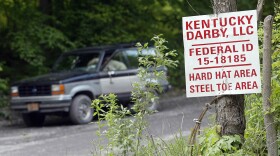Robert Benincasa
Robert Benincasa is a computer-assisted reporting producer in NPR's Investigations Unit.
Since joining NPR in 2008, Benincasa has been reporting on NPR Investigations stories, analyzing data for investigations, and developing data visualizations and interactive applications for NPR.org. He has worked on numerous groundbreaking stories, including data-driven investigations of the inequities of federal disaster aid and coal miners' exposures to deadly silica dust.
Prior to NPR, Benincasa served as the database editor for the Gannett News Service Washington Bureau for a decade.
Benincasa's work at NPR has been recognized by many of journalism's top honors. In 2014, he was part of a team that won an Investigative Reporters & Editors Award, and he shared Robert F. Kennedy Journalism Awards with Investigations Unit colleagues in 2016 and 2011.
Also in 2011, he received numerous accolades for his contributions to several investigative stories, including an Edward R. Murrow Award for Excellence in Coverage of Trauma, an Investigative Reporters & Editors Radio Award, the White House News Photographers Association's Eyes of History Award for multimedia innovation, and George Polk and George Foster Peabody awards.
Benincasa served on the faculty of Georgetown University's Master of Professional Studies program in journalism from 2008 to 2016.
-
A Labor Department audit found no correlation between the federal system that fines mining companies for unsafe conditions and safety in mining operations.
-
The federal government spends billions of dollars each year helping communities rebuild after disasters and to prevent future damage. But that money isn't always allocated to those who need it most.
-
NPR analyzed records from a Federal Emergency Management Agency database of more than 40,000 buyouts and found that most went disproportionately to whiter communities.
-
More than 2,000 miners in Appalachia are dying from an advanced stage of black lung. NPR and Frontline have found the government had multiple warnings and opportunities to protect them, but didn't.
-
Federal regulators have found about 1 in 4 funeral homes don't disclose their general price lists as required by the 1984 rule.
-
This year, new international regulations on rosewood have reverberated through the music industry, costing tens of millions in lost sales and extra administrative costs.
-
City officials had evidence that the rally would be violent, but they didn't use that evidence in court. Instead, they tried to move the rally to another location. The judge denied the request.
-
Way too many residents of U.S. nursing homes are on antipsychotic drugs, critics say. It's often just for the convenience of the staff, to sedate patients agitated by dementia. That's illegal.
-
An NPR probe finds many nursing homes are still prescribing schizophrenia drugs to calm dementia patients — despite FDA warnings — but only 2 percent of excessive-medication cases result in penalties.
-
The staff's goal was to reduce the prescription of antipsychotic drugs by 20 percent. In the first year, they cut use by 97 percent. How? By addressing the real reasons for agitation and aggression.







